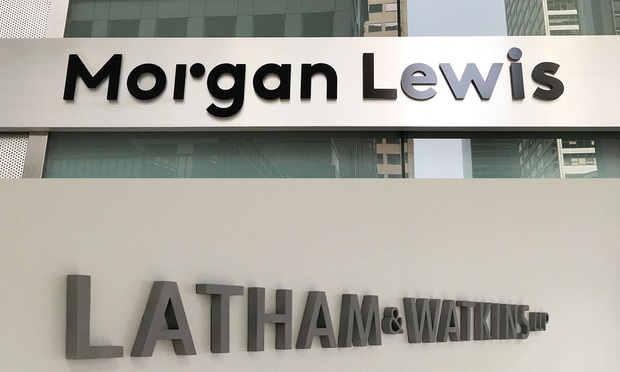Daily Dicta: From Mattresses to Burritos, 'Event-Based' Securities Class Actions Fall Flat
As a pair of wins by Morgan Lewis and Latham show, securities class action plaintiffs can only stretch the event-based theories so far.
April 02, 2019 at 12:08 PM
7 minute read
 Morgan Lewis and Latham Watkins signs.
Morgan Lewis and Latham Watkins signs.
Not so long ago, most securities class actions were bloodless things, involving financial misrepresentations and omissions.
Important? Yes. Fun to read about? No.
Say what you will about the rise of so-called event-driven securities class actions, it's definitely made the cases more interesting—at least to those of us who aren't passionate about dissecting accounting missteps.
Consider a pair of wins last week by litigators from Morgan, Lewis & Bockius and Latham & Watkins. In both instances, their clients—mattress maker Tempur Sealy for Morgan Lewis and Chipotle Mexican Grill for Latham—were hit with securities class actions following bad news. (Or, in poor Chipotle's case, more bad news.)
And in both cases, the plaintiffs firms—Labaton Sucharow and Pomerantz—were sent packing.
Experts have been talking about this new breed of event-based litigation since about 2017. Columbia Law School Professor John Coffee observed that the suits often follow the first wave of cases by “injured consumers, workers, or others with tort claims, but the caboose on this train is the securities class action, which will claim that investors were injured by the defendant company's failure to disclose its misconduct or negligence.”
But as the Morgan Lewis and Latham wins show, plaintiffs can only stretch the theories so far.
For example, the Morgan Lewis Tempur Sealy case takes us into the cutthroat world of mattress sales. Seriously, these guys don't play nice.
 From Mattresses to Burritos, 'Event-Based' Securities Class Actions Fall FlatTempur Sealy relies on a handful of retailers for a big chunk of its business. In 2016, one of them— Mattress Firm—acquired another, Sleepy's. The merged company accounted for 21 percent of Tempur Sealy's sales in 2016.
From Mattresses to Burritos, 'Event-Based' Securities Class Actions Fall FlatTempur Sealy relies on a handful of retailers for a big chunk of its business. In 2016, one of them— Mattress Firm—acquired another, Sleepy's. The merged company accounted for 21 percent of Tempur Sealy's sales in 2016.
“This transition temporarily hurt Mattress Firm's business,” U.S. District Judge Lewis Kaplan of the Southern District of New York noted.
Tempur Sealy's alleged response? To take advantage of Mattress Firm's vulnerable position and insist that they renegotiate their existing contracts on terms more favorable to Tempur Sealy.
Like I said, the mattress business is rough.
But then—uh-oh—Steinhoff International Holdings N.V. bought Mattress Firm, and the new parent company makes its own mattresses. They didn't really need Tempur Sealy anymore. The tables were turned.
Steinhoff demanded “considerable changes to their agreements, including significant economic concessions,” according to a Tempur Sealy press release. The parties couldn't reach a deal and they terminated their contracts as of January 27, 2017.
Tempur Sealy's stock promptly took a nosedive, dropping from$63.19 to $43.00 per share.
But “Karma's a bitch” isn't a viable cause of action. Instead, the plaintiffs claimed Tempur Sealy leaders should have disclosed that the company's relationship with Mattress Firm was deteriorating and the risk that Tempur Sealy would terminate the contracts had increased. They also said Tempur Sealy should have warned investors about the long-term implications of the Steinhoff/ Mattress Firm union.
Kaplan had more than a few problems with this. “With respect to the long-term implications of the Mattress Firm acquisition by Steinhoff, plaintiffs do not plead what exactly these implications were, are, or will be,” he wrote.
“Plaintiffs simply assert that defendants would have known these things—presumably via clairvoyance and a secret window into the corporate thinking and workings of Mattress Firm—and disclosed them.”
Oh burn.
But wait, there's more. “[P]laintiffs have failed to plead sufficiently the very existence of the alleged omitted facts. Accordingly, their omission cannot render any statement misleading or actionable under Section 10(b). Moreover, even if the alleged omitted facts were true, defendants had no duty to disclose them.”
The Morgan Lewis team included Jordan Hershman, Jason Frank, Jeff Goldman and Emily Renshaw.
Lawyers from Latham also put a stake through a suit against Chipotle, which has been associated with more than its share of foodborne illness outbreaks.
Already, Chipotle dodged one securities class action when a federal judge in Manhattan two years ago tossed a suit stemming from a rash of E. coli, salmonella and norovirus outbreaks in 2015.
The plaintiffs in that case complained that after Chipotle switched to prepping produce in each store rather than at a central site (because fresh-chopped tomatoes taste better), it increased the opportunity for food-borne illness—but that Chipotle didn't disclose this risk.
Right. Because as the judge found, Chipotle didn't actually realize it was a risk until people started getting sick all over the place.
Chipotle promised to do better, announcing it was taking steps to comply with all food safety regulations and training its employees on food safety.
We know where this is going, right? A Salmonella outbreak in 2016 in Michigan, then a norovirus cluster in Minnesota; a norovirus outbreak in Florida in 2017, and another in Virginia—all allegedly associated with Chipotle.
Chipotle shareholders were understandably less than pleased with the performance of the stock. But again, the securities laws don't provide a natural framework for redress.
The plaintiffs claimed Chipotle made materially false or misleading claims about food safety, failing to disclose, for example, that its restaurants were “chronically and severely understaffed, which prevented the effective implementation of food safety protocols.”
They also said employees regularly faked records to show “temperatures that were higher or lower than required by relevant food safety standards” and that the company's restaurants were widely failing food safety audits.
Andrew Clubok, who led the defense for Chipotle in the first suit when he was a partner at Kirkland & Ellis, reprised his role at his new home at Latham, along with Susan Engel and Matthew Peters.
“From the start of the class period, Chipotle was forthright with the public about the enhanced food safety program's limitations,” he wrote.
Given the nearly 2,000-restaurant chain's reliance on fresh, unprocessed produce and meat, “Chipotle candidly and repeatedly disclosed that it could not guarantee the enhanced food safety procedures would prevent future incidents of food-borne illnesses.”
Senior U.S. District Judge Wiley Daniel in Colorado was convinced, dismissing the case on March 29 with prejudice.
“Plaintiffs do not allege that the new food safety protocols were not implemented at all; instead, they allege only that the protocols were not effectively implemented as indicated in some of the audits,” Daniel wrote. “Indeed, it is undisputed that many of Chipotle's new food safety protocols were successfully implemented.”
Moreover, the judge found that “an outbreak due to a single restaurant's failure to comply with the new food safety protocols is different from an outbreak due to Chipotle's failure to implement the new food safety protocols in the first place.”
This content has been archived. It is available through our partners, LexisNexis® and Bloomberg Law.
To view this content, please continue to their sites.
Not a Lexis Subscriber?
Subscribe Now
Not a Bloomberg Law Subscriber?
Subscribe Now
NOT FOR REPRINT
© 2025 ALM Global, LLC, All Rights Reserved. Request academic re-use from www.copyright.com. All other uses, submit a request to [email protected]. For more information visit Asset & Logo Licensing.
You Might Like
View All
Litigators of the Week: After Two Big Wins for Plaintiffs, a Defense Verdict for Infant Formula Makers

Litigators of the Week: King & Spalding Gets 2nd Circuit to Uphold 'All Natural' Win For Kind Bar Maker

How Overseeing Legal Operations Has Affected How Steve Mahieu of Kraft Heinz Looks at Litigation

Litigators of the Week: Proskauer Scores a Defense Win for Last Defendant Standing in Broiler Chicken Antitrust Suit
Trending Stories
- 15th Circuit Considers Challenge to Louisiana's Ten Commandments Law
- 2Crocs Accused of Padding Revenue With Channel-Stuffing HEYDUDE Shoes
- 3E-discovery Practitioners Are Racing to Adapt to Social Media’s Evolving Landscape
- 4The Law Firm Disrupted: For Office Policies, Big Law Has Its Ear to the Market, Not to Trump
- 5FTC Finalizes Child Online Privacy Rule Updates, But Ferguson Eyes Further Changes
Who Got The Work
J. Brugh Lower of Gibbons has entered an appearance for industrial equipment supplier Devco Corporation in a pending trademark infringement lawsuit. The suit, accusing the defendant of selling knock-off Graco products, was filed Dec. 18 in New Jersey District Court by Rivkin Radler on behalf of Graco Inc. and Graco Minnesota. The case, assigned to U.S. District Judge Zahid N. Quraishi, is 3:24-cv-11294, Graco Inc. et al v. Devco Corporation.
Who Got The Work
Rebecca Maller-Stein and Kent A. Yalowitz of Arnold & Porter Kaye Scholer have entered their appearances for Hanaco Venture Capital and its executives, Lior Prosor and David Frankel, in a pending securities lawsuit. The action, filed on Dec. 24 in New York Southern District Court by Zell, Aron & Co. on behalf of Goldeneye Advisors, accuses the defendants of negligently and fraudulently managing the plaintiff's $1 million investment. The case, assigned to U.S. District Judge Vernon S. Broderick, is 1:24-cv-09918, Goldeneye Advisors, LLC v. Hanaco Venture Capital, Ltd. et al.
Who Got The Work
Attorneys from A&O Shearman has stepped in as defense counsel for Toronto-Dominion Bank and other defendants in a pending securities class action. The suit, filed Dec. 11 in New York Southern District Court by Bleichmar Fonti & Auld, accuses the defendants of concealing the bank's 'pervasive' deficiencies in regards to its compliance with the Bank Secrecy Act and the quality of its anti-money laundering controls. The case, assigned to U.S. District Judge Arun Subramanian, is 1:24-cv-09445, Gonzalez v. The Toronto-Dominion Bank et al.
Who Got The Work
Crown Castle International, a Pennsylvania company providing shared communications infrastructure, has turned to Luke D. Wolf of Gordon Rees Scully Mansukhani to fend off a pending breach-of-contract lawsuit. The court action, filed Nov. 25 in Michigan Eastern District Court by Hooper Hathaway PC on behalf of The Town Residences LLC, accuses Crown Castle of failing to transfer approximately $30,000 in utility payments from T-Mobile in breach of a roof-top lease and assignment agreement. The case, assigned to U.S. District Judge Susan K. Declercq, is 2:24-cv-13131, The Town Residences LLC v. T-Mobile US, Inc. et al.
Who Got The Work
Wilfred P. Coronato and Daniel M. Schwartz of McCarter & English have stepped in as defense counsel to Electrolux Home Products Inc. in a pending product liability lawsuit. The court action, filed Nov. 26 in New York Eastern District Court by Poulos Lopiccolo PC and Nagel Rice LLP on behalf of David Stern, alleges that the defendant's refrigerators’ drawers and shelving repeatedly break and fall apart within months after purchase. The case, assigned to U.S. District Judge Joan M. Azrack, is 2:24-cv-08204, Stern v. Electrolux Home Products, Inc.
Featured Firms
Law Offices of Gary Martin Hays & Associates, P.C.
(470) 294-1674
Law Offices of Mark E. Salomone
(857) 444-6468
Smith & Hassler
(713) 739-1250






